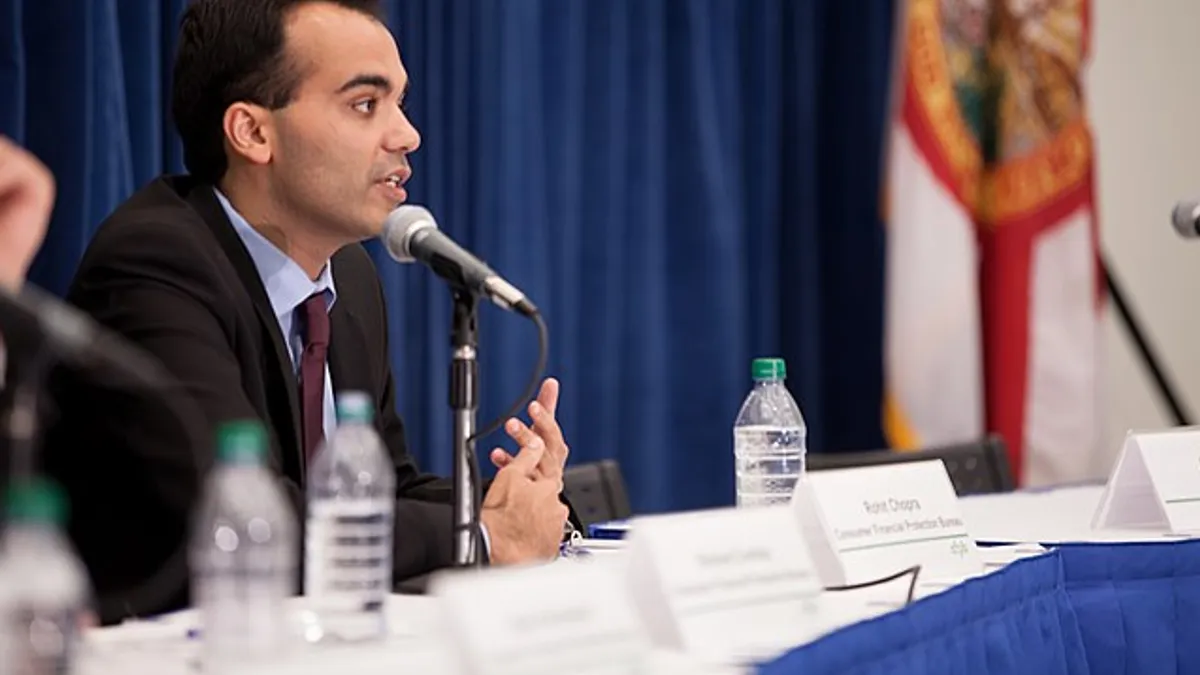Dive Brief:
- The Consumer Financial Protection Bureau plans to hire attorneys, economists and paralegals to expand its enforcement team, according to a Monday blog post.
- The government agency plans to hire about 75 people over the course of 2024, according to a presentation at a Tuesday information session.
- The expansion of the enforcement team is meant “to send a clear deterrent message to entities that are within our authority,” CFPB enforcement attorney Molly McOwen said during the information session aimed at candidates for jobs at the agency.
Dive Insight:
Late last year, the agency targeted a 50% expansion of the enforcement division, according to an October report by American Banker, which estimated at that time that the team employed about 150 staff.
The blog post and the event highlighted the bureau’s aim to hire specialized staff for increased oversight, including of technology companies. When asked about the role that the new technology-focused staff would play, a bureau spokesperson said the following by email: “The addition of technologists to enforcement will increase the CFPB’s capacity to enforce the law when violations result from a broad array of emerging technologies.”
The agency used Monday’s blog post to tout its accomplishments over the last year. The CFPB filed 29 enforcement actions and resolved six previously-filed lawsuits. Those orders resulted in compensation to consumers of about $3.07 billion and civil penalties of about $498 million.
In one July example of the bureau’s work last year, it fined Bank of America $250 million. The federal regulator alleged the bank opened fake accounts and saddled customers with junk fees.
This year, the bureau has multiple payments issues to consider, based on actions initiated last year. Last September, it released a report scrutinizing Apple and Google’s control of mobile contactless payments. Then in November, it proposed a rule that would extend its reach to over a dozen payment technology companies. A group of U.S. senators wrote to the bureau in December asking it to focus on buy now, pay later companies. And this month, the CFPB said it will issue guidance on earned wage access firms.
Underpinning all of these actions is Director Rohit Chopra’s vision of open banking, which he has said will give consumers greater control over their financial data by requiring banks to share such data with third parties like fintechs. Chopra proposed an open banking rule last October.
But while the agency pursues Chopra’s goal of open banking, the CFPB must still face an existential threat in the form of a Supreme Court case. The case, which was argued before the court last October, challenges the funding structure of the bureau.
Monday’s blog post signals that the bureau feels confident that it will not be handed a loss by the court, Norton Rose Fulbright senior counsel Eamonn Moran said in a Tuesday interview. Moran, who specializes in consumer financial services, previously worked as a CFPB attorney, according to his LinkedIn profile.
“If they’re looking to add this many people, it’s probably going to increase the budget,” Moran said. “They must not be planning for the Supreme Court to come out and say that the funding structure is unconstitutional.”











